Citizen King was an American music group from Milwaukee, Wisconsin, whose style was a mix of hip-hop, soul, and punk. They are best known for their top 40 hit "Better Days ", which peaked at No. 25 on the Billboard Hot 100 chart in 1999.

"The Great Beyond" is a song by American rock band R.E.M., written for the 1999 film Man on the Moon. It was released as a single the same year for support of the film's soundtrack album. On the soundtrack, there is some dialogue from the movie at the end of the track; meanwhile, the single version is a radio edit, with the bridge omitted.

"Strange Currencies" is a song by American rock band R.E.M. It was included on their ninth studio album, Monster (1994), and was released as the album's third single on April 18, 1995, by Warner Bros. Records. The song reached number nine on the UK Singles Chart and peaked at number 47 in the United States. Like "Everybody Hurts" on R.E.M.'s previous album, it has a time signature of 6
8. The song's music video was directed by Mark Romanek.
"Sky Fits Heaven" is a song recorded by American singer Madonna for her seventh studio album, Ray of Light (1998). It was written and produced by Madonna and Patrick Leonard; the song also contained additional production from William Orbit, and lyrical interpretations from British poet Max Blagg's 1992 poem, What Fits?. Uncredited in the album's official liner notes, Blagg's role in the song was the subject of several publications questioning Madonna's inspiration behind the track. A remix was created by Sasha and Victor Calderone, and was released as a promotional single by Maverick and Warner Bros. on October 2, 1998.
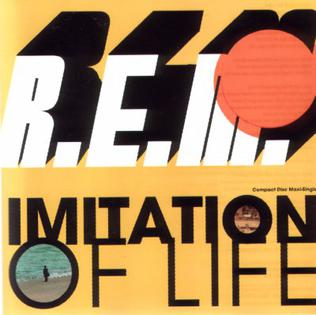
"Imitation of Life" is a song by American alternative rock band R.E.M. It was written by band members Peter Buck, Mike Mills, and Michael Stipe and produced by the band with Pat McCarthy for their 12th studio album, Reveal (2001). The track's title comes from Douglas Sirk's 1959 film of the same name and is used as a metaphor for adolescence and adulthood. One of R.E.M.'s most pop-influenced tracks, "Imitation of Life" has been described lyrically as "see[ing] through the puffed-up performance of a hopeful entertainer", as well as the enjoyment of love.
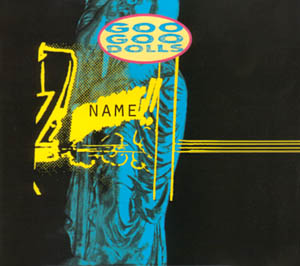
"Name" is a song by American rock band Goo Goo Dolls. It was released in September 1995 as the third single from their fifth studio album, A Boy Named Goo (1995). "Name" became the band's first major hit, topping both the US Modern Rock Tracks chart and the Album Rock Tracks chart. It also reached number five on the Billboard Hot 100. In Canada, "Name" peaked at number two on the RPM 100 Hit Tracks chart and number one on the RPM Alternative 30.

"All or Nothing" is a song by American singer and actress Cher from her 22nd studio album, Believe (1998). It was released as the third international single from Believe on June 7, 1999, by WEA and Warner Bros. Records. "All or Nothing" reached the top 40 of the US Billboard Hot 100 Singles Sales chart at number 38 and peaked at number one on the Billboard Dance Club Play chart. In Europe, the single was a top-10 hit in the Czech Republic, Finland, Hungary, and Scotland.

"Believe" is a song by American singer Cher from her 22nd studio album, Believe (1998). It was released as the album's lead single on October 19, 1998, by Warner Bros. Records. After circulating for months, a demo written by Brian Higgins, Matthew Gray, Stuart McLennen and Timothy Powell, was submitted to Warner's chairman Rob Dickins, while he was scouting for songs to include on Cher's new album. Aside from the chorus, Dickins was not impressed by the track so he enlisted two more writers, Steve Torch and Paul Barry in order to complete it. Cher also later did some adjustments herself to the lyrics but did not get a songwriting credit. Recording took place at Dreamhouse Studio in West London, while production was handled by Mark Taylor and Brian Rawling.

"Strong Enough" is a song by American recording artist and actress Cher from her twenty-second studio album, Believe (1998). The song was released as the second single from the album. It was released on February 22, 1999, by Warner Bros, and WEA. The song's composition and musical style is strongly reminiscent of 1970s disco music. The song received positive reviews from music critics, many calling it a highlight to Believe and comparing it to Gloria Gaynor's "I Will Survive". The song had less success in the US Billboard Hot 100, where it peaked at number fifty-seven, but did top the Billboard Hot Dance Club Play chart. It also went to number one in Hungary and into the top 10 in Austria, Belgium, Finland, France, Germany, Iceland, Italy, New Zealand, Scotland, Spain, Switzerland and the UK.

"There You'll Be" is a song by American country music singer Faith Hill. Written by Diane Warren, produced by Trevor Horn and Byron Gallimore, and orchestrated by David Campbell, the song was released on May 21, 2001, and was included on the Pearl Harbor soundtrack. The track also appears on Hill's greatest hits albums There You'll Be and The Hits. "There You'll Be" is about remembering deceased acquaintances and reminding oneself that they will always be with them. The power ballad was first offered to Celine Dion, who turned it down because she did not want to record another romantic ballad for a soundtrack album.
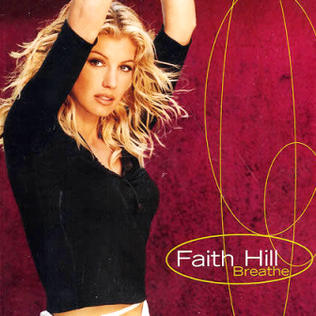
"Breathe" is a song written by Stephanie Bentley and Holly Lamar and recorded by American country music artist Faith Hill. Warner Bros. Records released it on October 4, 1999, as the first single from Hill's fourth album of the same name (1999). The song was produced by Byron Gallimore and Hill. "Breathe" became Hill's seventh number one on the Hot Country Songs chart in the United States, spending six weeks at number one. It also peaked at number two on the Billboard Hot 100 chart in April 2000. Despite not peaking at number one, it was the number-one single of 2000.

"Cry" is a song by American country music singer Faith Hill. It was released as the first single from her fifth studio album of the same name (2002). The song was originally written and recorded by singer-songwriter Angie Aparo for his 1999 album, The American. In 2003, at the 45th Annual Grammy Awards, Hill won the Grammy Award for Best Female Country Vocal Performance for "Cry", marking her second win in the category.

"This Kiss" is a song by American country music singer Faith Hill from her third studio album Faith. It was written by Beth Nielsen Chapman, Robin Lerner and Annie Roboff, and produced by Hill and Byron Gallimore. It was released on February 23, 1998, as the album's first single.

"Black Balloon" is a song by American rock band Goo Goo Dolls. It was released in June 1999 as the fourth single from the band's sixth studio album, Dizzy Up the Girl (1998), and reached No. 3 in Canada, No. 16 in the United States, and No. 23 in Iceland.

"I Don't Want to Wait" is a song written, recorded, and produced by American singer-songwriter Paula Cole. Cole wrote the song in mid-1996 and released it as second single from her second studio album, This Fire (1996), on October 14, 1997. The single release was successful, reaching No. 11 in the United States and No. 5 in Canada. VH1 ranked "I Don't Want to Wait" as one of the 100 Greatest Songs of the '90s at No. 81. The song later served as the opening theme for the American teen drama television series Dawson's Creek, which ran from 1998 to 2003.

"Lullaby" is a song by American rock singer Shawn Mullins from his fourth studio album, Soul's Core (1998). It was released in August 1998 and is Mullins' most successful song to date, reaching number one on the US Billboard Adult Top 40, number seven on the Billboard Hot 100, and number nine on the Billboard Modern Rock Tracks chart. It also found success abroad, reaching number nine on the UK Singles Chart, number five in Australia, and number two in Canada.

"Where Have All the Cowboys Gone?" is a song by American singer Paula Cole. It was released on March 25, 1997, as the lead single from her second studio album, This Fire. The song is Cole's only top-ten hit on the US Billboard Hot 100, reaching number eight, and was her first top-ten hit in Canada, where it reached number seven. It was additionally a critical success, earning nominations for three Grammy awards: Record of the Year, Song of the Year, and Best Female Pop Vocal Performance.

"Honey" is a song by American electronic musician Moby. It was released as the lead single from his fifth studio album Play on August 24, 1998. The song samples the 1960 recording "Sometimes" by American blues singer Bessie Jones. Moby first heard "Sometimes" on a box set collection of folk music compiled by Alan Lomax, and subsequently composed "Honey" around vocal samples from the Jones song.
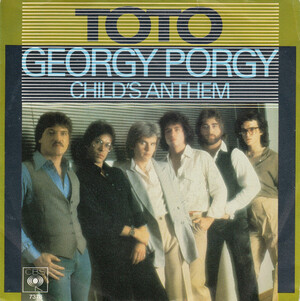
"Georgy Porgy" is a song by American rock band Toto. It was written by band member David Paich and included on their self-titled debut album in 1978. Released as the album's third single in 1979, the song reached number 11 on the New Zealand Singles Chart and number 48 on the US Billboard Hot 100. It also peaked at number 18 on Billboard's Hot R&B/Hip-Hop Songs chart.
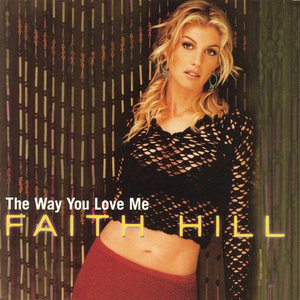
"The Way You Love Me" is a song written by Keith Follesé and Michael Dulaney and recorded by American country music singer Faith Hill. It was released on February 14, 2000, as the second single from her fourth studio album, Breathe (1999), and was later released to pop radio on August 15, 2000, becoming Hill's third single serviced to the format. The track utilizes Auto-Tune for Hill's backup vocals.

















